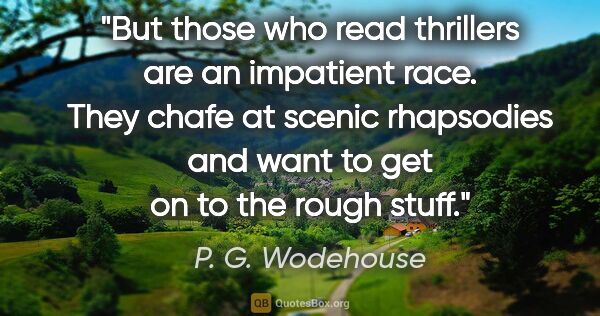Reading Quotes (page 100)
The highest form of morality is not to feel at home in ones own home." Most great works of the imagination were meant to make you feel like a stranger in your own home. The best fiction always forced us to question what we took for granted. It questioned traditions and expectations when they seemed too immutable. I told my students I wanted them in their readings to consider in what ways these works unsettled them, made them a little uneasy, made them look around and consider the world, like...
Azar Nafisi

No other library anywhere, for example, has a whole gallery of unwritten books - books that would have been written if the author hadn't been eaten by an alligator around chapter 1, and so on. Atlases of imaginary places. Dictionaries of illusory words. Spotter's guides to invisible things. Wild thesauri in the Lost Reading Room. A library so big that it distorts reality and has opened gateways to all other libraries, everywhere and everywhen...
Terry Prachett

I keep such music in my brain. No din this side of death could quell; Glory exhulting over pain, And Beauty, garlanded in hell. My dreaming spirit will not heed. The roar of guns that would destroy. My life that on the gloom can read. Proud-surging melodies of joy. To the world's end I went, and found. Death in his carnival of glare; But in my torment I was crowned, And music dawned above despair
Siegfried Sassoon
I try to believe everything I read in the newspapers, but I had difficulty with last week's account of the London vagrant who was found, after death, to be carrying 1,500 in small change in his socks. My reason for doubting the story is that I, too, like to carry small change in my socks, but I have found that with more that 15 or 20 worth it becomes impossible to walk.
Auberon Waugh
The scene is a writer's study, shabby, drafty but tax-deductible. The writer is reading the last hundred pages of his work in progress. For the past fifty or so, a kind of slow terror has been rising in his breast. All these pages had seemed necessary. They contain many good things. Ironies. Insights. And yet they seem to have a certain ineffable unsatisfactoriness. There is a word to describe this quality, the writer thinks, a horrible word. The B word. He begins to strike his forehead with...
Robert Stone
Australian history is almost always picturesque; indeed, it is so curious and strange, that it is itself the chiefest novelty the country has to offer, and so it pushes the other novelties into second and third place. It does not read like history, but like the most beautiful of lies. And all of a fresh new sort, no mouldy old stale ones. It is full of surprises, and adventures, and incongruities, and contradictions, and incredibilities; but they are all true, they all happened.
Mark Twain

Not long after the book came out I found myself being driven to a meetingby a professor of electrical engineering in the graduate school I of MIT. He said that after reading the book he realized that his graduate students were using on him, and had used for the ten years and more he had been teaching there, all the evasive strategies I described in the book? mumble, guess-and-look, take a wild guess and see what happens, get the teacher to answer his own questions, etc. But as I later...
John Holt
My dear Lucy,I wrote this story for you, but when I began it I had not realised that girls grow quicker than books. As a result you are already too old for fairy tales, and by the time it is printed and bound you will be older still. But some day you will be old enough to start reading fairy tales again. You can then take it down from some upper shelf, dust it, and tell me what you think of it.
C. S. Lewis
The great bulk of the legal voters of the South were men who owned no slaves; their homes were generally in the hills and poor country; their facilities for educating their children, even up to the point of reading and writing, were very limited; their interest in the contest was very meagre--what there was, if they had been capable of seeing it, was with the North; they too needed emancipation.
Ulysses S. Grant
